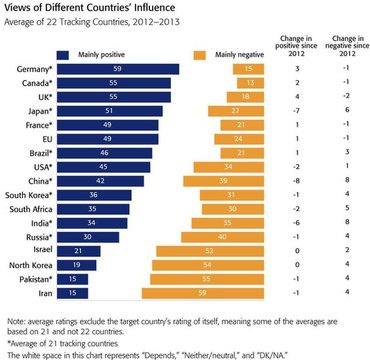 Graphic from the BBC’s Country Poll 2013. [Click to Expand]
Graphic from the BBC’s Country Poll 2013. [Click to Expand]
21% said Israel had a “positive influence” on the world
52% said Israel had a “negative influence” on the world
[25-to-10 : Ratio of Negatives-to-Positives]
North Korea
19% said NK had a “positive influence” on the world
54% said NK had a “negative influence” on the world
[28-to-10 : Ratio of Negatives-to-Positives]
The USA was viewed narrowly more positively than negatively. The BBC headlined that Germany was “the most popular country in the world”. In terms of positive-to-negative ratio (as above), though, Canada seems to be the real #1. Germany’s ratio is 39-to-10 positive; Canada’s ratio: 42-to-10 positive. / The USA’s ratio in 2013 is 13-to-10 positive, similar to South Korea’s 12-to-10 positive. Japan’s popularity in 2013 took a hit, probably due to the island disputes, and maybe the more-recent depreciation of their currency. In 2012, it seems that Japan had an impressive 28-to-10 positive ratio, down in 2013 to 19-to-10.
There has been a sharp drop in positive ratings [of the EU] by Germans, down 14 points to 59%. Canadians and Americans both give significantly lower ratings to the EU. In the UK, positive views of the EU continue to fall steadily and, for the first time this year, more Britons rate it negatively (47%) than positively (42%).
